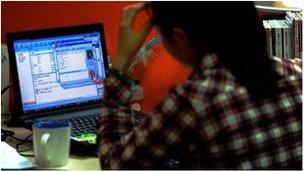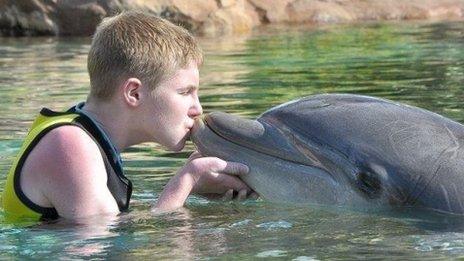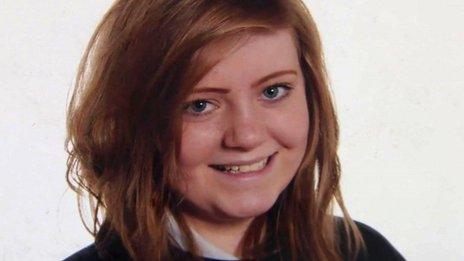Cyber-bullying: Horror in the home
- Published

A recent survey said one in five children had bad experiences online
"He was a happy laddie, not depressed and the last type of person you would think would take their life.
"We're a very close family and I just wished he had come to me and said something."
The words of the mother of 17-year-old Daniel Perry, who took his own life after he was apparently blackmailed after befriending someone he thought was a girl of his age online.
In reality, it is thought he was "talking" to an extortion gang.
The apprentice mechanic was told on 15 July to deposit thousands of pounds in to an account or images or video of him would be shared with his family and friends or the public.
Hours later, he was dead.
It is a story that sends shivers down the spine of most parents.
In an interview with the Dunfermline Press, external, his mother said he had "not being doing anything wrong - just what anyone his age might do", but had been too "embarrassed and horrified" to tell anyone about what had happened.
'No signs'
Three months earlier, it is reported, the teenager had been bullied on the social networking site ask.fm and received messages telling him to kill himself.

Daniel Perry on holiday in Florida aged 16
Father and co-founder of the Cybersmile website, Dan Raisbeck, says the case is "extremely distressing" and shows the horrific consequences of "online hate".
"For a person to be manipulated in their home and bullied in their own loving home which is supposed to be where you feel safe... if that is undermined, what has a child got?" he said.
"This case is extremely distressing because of the short time span. There seemed to be no signs."
Psychologist Dr Lucy Maddox said for many young people, opening up to parents about something like cyber blackmail would be extremely difficult.
Not commenting on Daniel Perry's case in particular, she said: "Trying to talk to parents, especially if it's about sex, is very difficult, especially if you think of it as something you are ashamed of.
"Shame is a powerful driver not to tell someone something, so telling a parent that you have sent a naked picture of yourself... it's no wonder they don't tell. Sexual shame is a double whammy."
Dr Maddox said teenagers were prone to risky behaviour and were very influenced by their peer group and wanted to fit in, so might get drawn in to sending intimate images of themselves.
"It's very common for young people to encourage each other to send sexual pictures," she said.
"In the short term, the teenager gets a thrill from sending the picture and feeling grown up but they do not see the long-term consequences of that picture being passed on and then feeling very exposed.
Warning signs
For a parent, the thought of a child suffering in silence at the mouse-clicks of bullies while they are just feet away, unaware, is an upsetting idea.
But are there warning signs?
Hannah Smith, 14, who was found hanged at her home in Leicestershire on 2 August, was said to have been bullied online for months.
Following her death her father David found bullying posts on her ask.fm site - but he said there were "no signs Hannah would do this" beforehand.
Mr Raisbeck set up the Cybersmile charity after his 10-year-old son was bullied online while playing a game where competitors team up against each other.
He says there were warning signs in his case.
"There was a real stark change in his demeanour, played out in my living room. I could see he was getting frustrated," he said.
"A lot of abuse and banter goes on in this game. His account was hacked. It got very nasty, out of control.
"The biggest sign for me was the intensity of the emotional response and distress. It's as good as being attacked verbally - as if someone is screaming in your face. It's like they are there in the room with them, with dad, unaware, sitting next to them."
Mr Raisbeck got his son to talk to him about what was going on and told him he should not "bite back" if people attacked him online.
Dr Maddox, a member of the British Psychological Society, says children of the internet age face the threat of bullies reaching them wherever they are.
"Before someone could be bullied at school but could go home and have respite from it, now it can go on for 24 hours," she said.

Hannah Smith's father David wants tighter controls of social networking sites
Some ask why teenagers - or adults - do not log off permanently from sites where they are getting abused.
Dr Maddox says that although staying there might bring "very negative consequences" in the long-term, there could be short-term gains which keep them there.
"It's a hook that keeps people there. If they are getting loads of 'likes' for a picture or even one or two people spurring them on, it can be a powerful hook to stay in," she said.
"They make people feel connected and part of something and that sometimes flips, making them feel much more isolated and that the community is against them.
"That is such a powerful driver for people who feel very despairing."
'Audience of trillions'
Lucie Russell, campaigns director at the YoungMinds charity, agrees that young people might stay in an online place where they are getting bullied because they want interaction and attention.
"They feed on each other, young people feed off each other; they want attention," she said.
"Being online means they are getting attention and there is an audience of trillions."
According to a recent report from the NSPCC, almost one in five children who use social networking sites had bad experiences online last year, including bullying, unwanted sexual messages and cyber stalking.
Ms Russell says the media likes to present the situation as one of "goodies and baddies", but that the reality is often more complicated.
"The people doing it [bullying and trolling] can also be victims themselves," she said.
"We say trolls are the baddies but it's more nuanced than this."
Bronagh received support from the NSPCC's ChildLine after she was bullied online when she was 13 and says the person who bullied her went on to suffer too.
In an account she gave through the charity, she described how accepting a casual acquaintance as a contact on a social network led to a stream of attacks.
"He started saying really nasty things about me and about my family. The first time it happened I just logged off, but it kept happening.
"He'd say horrible things about how I looked. He called me fat and ugly... he said I should want to kill myself.
Bronagh said she did not talk to her family about the problem, even though she knew they would be supportive, because the boy was saying nasty things about them. She confided in her friends and one of them challenged the boy online.
"He blamed me. I logged back on and he showed me these red marks on his neck over the webcam, and said that he'd tried to hang himself because of what I'd said about him. Then I started to feel like it was all my fault.
"I brought it to an end by permanently blocking him and I found out he was creeping [another site] to find out about me, so I changed my settings.
"Now I just wish I'd done it sooner - that I'd cut him off straight away and not let him get to me."
'Emotional cost'
Often excluded from the teenage world, what can parents do to help their children?
Lucie Russell from YoungMinds said: "We have no idea what they are doing in their rooms and how many things can you block?
"The answer is not to close these sites down but to help young people develop resilience and understanding of themselves and their needs, and to help them find ways of meeting those needs in a better way."
"The internet is our kids pavement," says Cybersmile co-founder Dan Raisbeck.
"They are learning their social dynamics on the internet and staying abreast of that as a parent is difficult.
"Engaging with a teenager about the colour of their socks can be impossible at times, so prying into their internet habits is going to be difficult, but parents need to engage more with them and support them.
He believes everyone has a responsibility to "get rid of online hate".
"Schools, authorities and the companies themselves have to do their bit and make sure that the message gets across so this behaviour is seen to be wrong and socially unacceptable," he said.
"We need to have a massive campaign showing the real emotional cost of losing someone through this and how it happens.
"I count myself quite lucky that I managed to engage with my kid before it went too far - and that's where parents need to be."
- Published16 August 2013
- Published7 August 2013
- Published11 August 2013
- Published9 August 2013
- Published8 August 2013
- Published8 August 2013